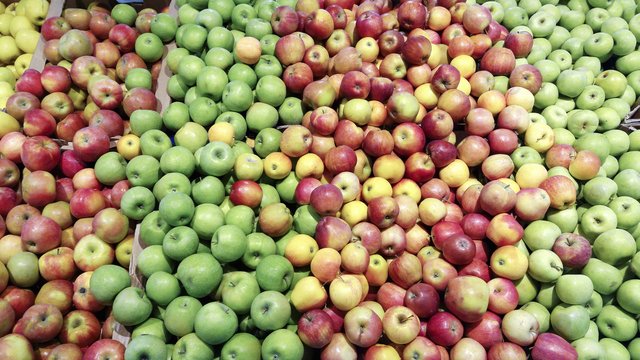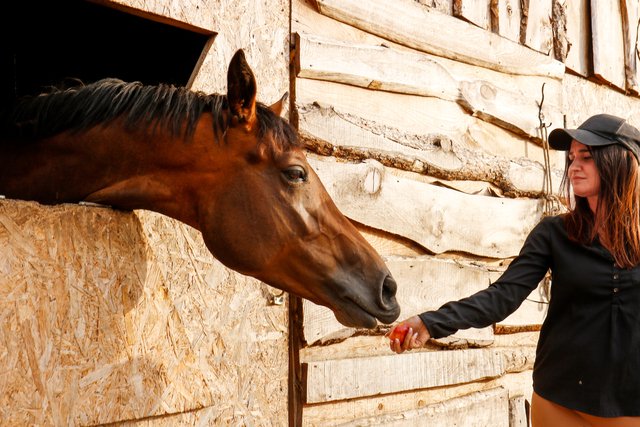Does Horses Eating Apples? Well, this delicious fruit not only brings joy to horses but also provides a range of health benefits.
Apples are a nutritious treat for horses, offering vitamins, minerals, and fiber crucial for their well-being.
Let’s explore why feeding apples to your equine companion can be a rewarding and healthy choice.
Understanding the Healthy Treat: Apples for Horses
If you’ve ever wondered why horses love apples so much, it’s because they are not only delicious but also packed with vital nutrients.
Apples are a good source of vitamins A and C, as well as dietary fiber. These nutrients can contribute to overall digestive health and immune function in horses.
Comparisons with Other Treats
Concerning choosing treats for your equine friend, apples stand out as a healthy option compared to many other common treats.
They are naturally low in sugar and calories, making them a preferable choice over sugary commercial treats or processed snacks that can contribute to weight gain and other health issues in horses.
| Vitamins A and C | Dietary Fiber |
Apples are a great option for horse treats due to their nutrient content and low sugar levels. They can be a healthy alternative to other treats that may contain high amounts of sugar and unhealthy additives.
Understanding the Healthy Treat: Apples for Horses
Comparisons with Other Treats
| Low in Sugar and Calories | Natural Source of Nutrients |
When comparing apples to other horse treats, their natural nutritional profile sets them apart as a wholesome option.
Choosing apples as a treat can provide your horse with vital nutrients without the negative effects of excess sugar or artificial additives commonly found in other treats.
Types of Apples Suitable for Horses
Many different apple varieties are suitable for feeding to horses.
It is essential to choose the right type of apple to ensure that your horse can enjoy a healthy treat without any negative side effects.
Some apples are too sweet or too tart for horses, so it is vital to select varieties that strike the right balance.
The size of the apple should also be taken into consideration, as smaller apples are easier for horses to eat.
| Gala | Fuji |
| Granny Smith | Golden Delicious |
| Red Delicious | Braeburn |
| Honeycrisp | Cortland |
| Jonathan | McIntosh |
Popular Apple Varieties
Varieties such as Gala, Fuji, and Granny Smith are popular choices for feeding horses. These apples are generally well-balanced in sweetness and tartness, making them a favorite among equines.
Seasonal Availability
Assuming you have access to a variety of apple types, it’s important to consider the seasonal availability when choosing apples for your horse.
Different varieties are in season at different times of the year, so be sure to select apples that are fresh and in season for optimal nutritional benefits.
For instance, you may find that crisp and juicy Honeycrisp apples are best enjoyed in the fall, while sweet and aromatic McIntosh apples are more readily available in late summer.
By being mindful of seasonal availability, you can provide your horse with a variety of fresh and delicious apples throughout the year.
Factors to Consider Before Feeding Apples to Horses

Now, before you toss an apple to your equine friend, consider the following factors:
- Check for any allergies or sensitivities your horse may have to apples.
- Remove all seeds from the apple before feeding it to your horse.
- Avoid feeding large quantities of apples at one time, as it can lead to digestive upset.
- Introduce apples slowly into your horse’s diet to monitor any adverse reactions.
Safety Considerations
The safety of your horse is of utmost importance when offering apples as a treat.
Always ensure that the apple is fresh, free from mold, and cut into bite-sized pieces to prevent choking hazards.
Assume that any uneaten portions are promptly removed from the feeding area.
Dietary Restrictions
Little is known about the effects of feeding apples to horses with metabolic conditions such as insulin resistance or Cushing’s disease.
Feeding high-sugar treats like apples may not be suitable for these horses, as it can disrupt their delicate dietary balance.
It’s imperative to consult with a veterinarian or equine nutritionist before incorporating apples into the diet of horses with such conditions.
Feeding apples to horses can be a healthy and enjoyable experience for both you and your equine companion.
By considering these factors and seeking professional advice when needed, you can ensure that apples are a safe and beneficial addition to your horse’s diet.
Step-by-Step Guide: Introducing Apples to Your Horse’s Diet
When introducing apples to your horse’s diet for the first time, offer a small amount to gauge their reaction.
It’s best to start with a quarter or half of an apple, sliced into smaller pieces to prevent choking hazards.
Gradual Increase in Quantity
Gradually increase the quantity of apples in your horse’s diet over a couple of weeks. Monitor your horse for any signs of digestive upset or sensitivity. It helps prevent any digestive issues that may arise from a sudden dietary change.
As you gradually increase the quantity of apples, ensure that they are fresh and free of any pesticides.
The high water content and natural sugars in apples can offer a healthy treat for your horse in moderation.
Tips for Feeding Apples to Horses
After washing and cutting the apples into bite-sized pieces, it is important to remove any seeds as they can be toxic to horses.
Feed apples in moderation to avoid upsetting the horse’s digestive system. Monitor the horse’s reaction to apples and make sure they are not allergic to them.
- Wash and cut apples into small pieces
- Remove seeds before feeding
- Feed in moderation
- Monitor for any signs of allergies or digestive issues
This ensures a safe and enjoyable treat for your equine friend.
Creative Serving Ideas
Now, get creative with how you serve apples to your horse. Try freezing apple slices for a refreshing summer treat, or mixing them with other horse-safe fruits like carrots for added variety and nutrition.
Enhancing the Treat Experience
Little changes can make a big difference in how your horse enjoys their apple treat.
Try offering the apple on a flat palm to encourage bonding and trust-building with your horse, that makes the treat even more special for both of you.
This small interaction can strengthen the bond between you and your horse, making treat time a rewarding experience for both of you.
Pros and Cons of Apples as a Horse Treat
Pros
Horses enjoy the sweet taste of apples, making it a delicious and nutritious treat for them.
Apples are a good source of vitamins A and C, as well as dietary fiber, which can aid in digestion.
Feeding your horse apples can also provide mental stimulation and help build a bond between you and your equine friend.
Cons
One potential downside of feeding apples to horses is the sugar content, which can be harmful if given in excess.
Too many apples can lead to weight gain and even contribute to conditions like laminitis.
Additionally, the seeds of apples contain small amounts of cyanide, which can be toxic if consumed in large quantities.
With that said, feeding apples to your horse in moderation can be a safe and enjoyable way to treat them while providing some health benefits.
It’s crucial to consider the overall diet and health of your horse when adding any new treats to their regimen.
Summing up
Conclusively, feeding horses apples can be a healthy treat due to the vitamins, minerals, and fiber they provide.
It is important to remember moderation and proper preparation to prevent any potential digestive issues.
By understanding the nutritional benefits and potential risks, horse owners can incorporate apples into their equine’s diet as a delicious and nutritious snack.
